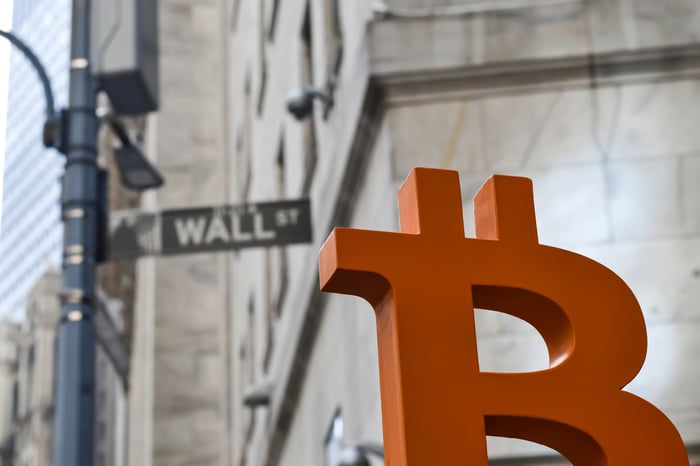|
|
|

|
|||||

|
|
The iShares Bitcoin Trust ETF generally tracks Bitcoin’s price, so investor returns should be similar to holding the coin after fees.
The ETF introduces extra risks because third parties such as Coinbase and BlackRock hold and manage the coins.
At the same time, the ETF structure adds regulatory safety and other benefits.
Whatever Bitcoin (CRYPTO: BTC) does over the next five years, iShares Bitcoin Trust ETF (NASDAQ: IBIT) will follow almost exactly the same pattern.
2030 is basically an eternity away when you're dealing with the volatile cryptocurrency market. Nobody knows exactly what's coming up, and there will almost certainly be both bullish and bearish surprises along the way. That being said, let me sketch up the most likely scenario for the iShares Bitcoin ETF over this period.
Where to invest $1,000 right now? Our analyst team just revealed what they believe are the 10 best stocks to buy right now. Learn More »
First and foremost, I do expect Bitcoin prices to rise in the long run.
The original cryptocurrency has proved its worth as a reliable tool for long-term wealth storage. The strictly limited supply should boost Bitcoin prices over time, assuming that demand for this digital coin increases. That's almost a foregone conclusion at this point, given the U.S. government's embrace of Bitcoin ownership and the emergence of Bitcoin-based exchange-traded funds (ETFs).
The Bitcoin community must stave off challenges from newer cryptocurrencies, including hard forks such as Bitcoin Cash (CRYPTO: BCH) and Bitcoin SV (CRYPTO: BSV). It should also trade in its encryption algorithm for a solution that's resistant against quantum computer decryption attacks, perhaps not right away but certainly in the next decade.
As long as Bitcoin can dodge these risks, it has a strong first-mover advantage as people, governments, and companies continue to embrace cryptocurrencies. Rising interest in Web3 solutions and decentralized finance apps will accelerate that trend. Again, there are real risks on the table but I strongly expect Bitcoin to gain value over time.

Image source: Getty Images.
ETFs are incredibly good at reflecting the returns of their underlying holdings. In this case, you can bet that the iShares Bitcoin ETF will follow Bitcoin's every move.
There is a modest sponsor fee of 0.25% per year, allowing iShares owner Blackrock (NYSE: BLK) to make some money from running this popular ETF. Even so, it's hard to tell the cryptocurrency apart from the ETF in long-term price charts. As of August 19, both have gained roughly 141% since the ETF was launched:
So why bother buying spot-priced Bitcoin ETF shares instead of actual Bitcoins? Well, the ETF structure comes with a few benefits:
The iShares ETF isn't a free ride, of course. The benefits listed above should be considered alongside the risks and downsides involved in ETF ownership:
This is a simplified overview, in the interest of not writing a literal book. There are many more wrinkles and quirks to consider. However, for most intents and purposes, owning the iShares Bitcoin ETF over the next five years should be just as good (or, less likely, just as bad) as holding actual Bitcoins. I highlighted earlier why I think that's a winning idea with a couple of serious risks and plenty of volatility expected ahead.
So the iShares Bitcoin Trust ETF should post shareholder-friendly gains in the next five years, just like Bitcoin itself. The amount of upside remains to be seen, and opinions of Bitcoin's true value vary from nothing (Warren Buffett) to millions of dollars per coin (Michael Saylor, Cathie Wood). Most long-term investors should include a little bit of Bitcoin exposure in their portfolios, either directly or via ETFs.
Blackrock itself recommends limiting that exposure to 2% or less of the total portfolio value, and that advice comes from the largest Bitcoin ETF's sponsor firm. In other words, Bitcoin (and its ETFs) looks enticing in the long term but it's still a high-risk investment.
Before you buy stock in iShares Bitcoin Trust, consider this:
The Motley Fool Stock Advisor analyst team just identified what they believe are the 10 best stocks for investors to buy now… and iShares Bitcoin Trust wasn’t one of them. The 10 stocks that made the cut could produce monster returns in the coming years.
Consider when Netflix made this list on December 17, 2004... if you invested $1,000 at the time of our recommendation, you’d have $654,624!* Or when Nvidia made this list on April 15, 2005... if you invested $1,000 at the time of our recommendation, you’d have $1,075,117!*
Now, it’s worth noting Stock Advisor’s total average return is 1,049% — a market-crushing outperformance compared to 183% for the S&P 500. Don’t miss out on the latest top 10 list, available when you join Stock Advisor.
*Stock Advisor returns as of August 18, 2025
Anders Bylund has positions in Bitcoin and iShares Bitcoin Trust. The Motley Fool has positions in and recommends Bitcoin. The Motley Fool recommends Coinbase Global. The Motley Fool has a disclosure policy.
| 1 hour | |
| 2 hours | |
| 2 hours | |
| 2 hours | |
| 3 hours | |
| 4 hours | |
| 4 hours | |
| 6 hours | |
| 6 hours | |
| 7 hours | |
| 7 hours | |
| 7 hours | |
| 8 hours | |
| 11 hours | |
| Feb-16 |
Join thousands of traders who make more informed decisions with our premium features. Real-time quotes, advanced visualizations, backtesting, and much more.
Learn more about FINVIZ*Elite